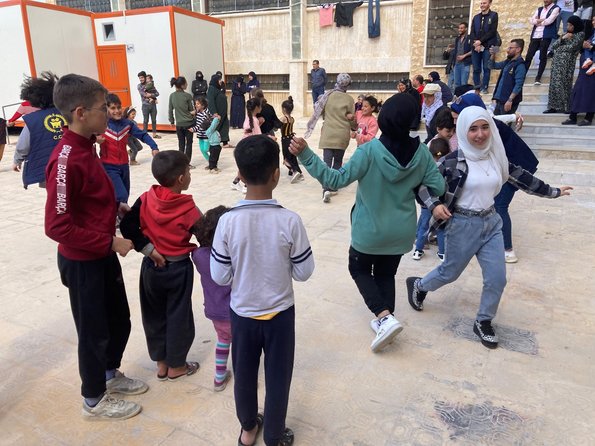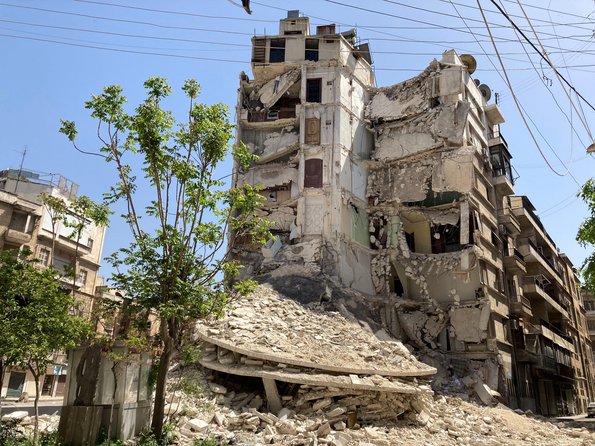We are losing our youth
People in Aleppo, Syria, suffer from the war, the sanctions and the consequences of the earthquake
by Karin Leukefeld, Bonn and Damascus
More than 8,000 people lost their lives in the great earthquake at the beginning of February in Aleppo, Idlib, Hama and along the Mediterranean coast between Latakia and Tartus. 45,000 families, 225,000 people were left homeless. In Aleppo city, 54 houses completely collapsed, according to official figures. Most of them had already been severely damaged by the war. In one house in the Aziziyeh district, eleven doctors and their families were torn from their lives.
According to official figures, 16 houses each in Aleppo and Latakia could be repaired so that families could return. The willingness to help is great, those who have a lot gave a lot, those who have little gave less. Clothes and hygiene articles were donated, some cooked, others gave food. The Aleppo Chamber of Industry collected donations that provided 9,000 families – about 49,000 people – with enough money to rent a new flat for 1.5 years. Syrian businessmen abroad donated for powdered milk, which is until today distributed free of charge to those in need outside the office in the centre of the city. Syrian industrialists in Egypt sent dialysis machines for the hospitals. But the need is still great, and not all of those affected have been able to find new accommodation.
The Al Beyrouni School
The Al Beyrouni School is located on the western outskirts of Aleppo. The primary school is part of a new building district that has been waiting for completion for more than ten years. The massive blocks of flats built of limestone survived the severe earthquake in early February, but because of the war, unilateral punitive economic measures (sanctions) by the European Union and the USA, and because of the severe economic crisis, many of the houses are still under construction.
The children of the families who had already moved there before the war attended the Al Beyrouni primary school. Since the earthquake, however, families who lost their homes have been living there. “Most of those who became homeless have since been able to stay with relatives or in other homes,” says Abdul Nasser M., a volunteer at the facility. “Today, 49 families are still living here, a total of 293 people. Of them, 76 are children older than 12.” The families have come to them at Al Beyrouni School from ten other schools because one could not yet find a new place for them, he said. There are daily school lessons for the children, which are supported by Unicef, among others. The Syrian organisation Amal (Hope) provides medical care for the people and has also set up the containers in the courtyard. One container has showers and toilets for men, a second container has showers and toilets for women. A third, slightly smaller container is for people with disabilities.
Medical and psychosocial help
Psychologists also come to the school every day to provide psychological and social care to affected children and adults, he says. “All the people went through the war, then there was Covid-19 and now the earthquake,” says the serious young man who wears glasses and a full beard. “People are completely overwhelmed by all of this.” He and his colleagues work and play with the children, he says, and are the contact persons for all questions.
26-year-old Abdul Nasser and his colleague Mohammed N. wear dark blue waistcoats with the letters C.C.S. on the back. Above there is a laurel crown with two children in the middle. C.C.S. stands for “Syrian Society for the Health of Children with Cancer”, Abdul Nasser explains. The aid organisation was founded in 2012 and now has branches all over the country, he says.
Then he introduces Mozna Olabi, a slender, youthful-looking woman. Mozna Olabi is the founder and director of the aid organisation. She is a resolute woman with a strong voice. She wears a long coat and her headscarf is tightly tied. Before the war, she studied fashion design in London, she says, laughing. Then she returned to Aleppo and helped. C.C.S. was born out of this help. “We receive donations from Syrian foundations and aid organisations,” she explains. The organisation is also allowed to accept donations from abroad. “We submit applications to the UN organisations,” which are often, but not always, approved, she says. The Norwegian Refugee Council also helps, she says. “I never doubted that we would win the war, she says. “But the destruction is just too great. We lost the well-educated people, now the earthquake.” She often wonders how Syria can overcome all this. Asked how foreign countries could help, she says after a short pause, “Just let us be. Then we’ll find a way.” “Let us be” also means lifting sanctions and economic warfare against Syria. But that is not what Ms Olabi says.
On her mobile phone, Ms Olabi opens pictures from the past Eid festival, the celebration at the end of the fasting month of Ramadan, also called Sugar Feast. “Here we have celebrated with children in Hasakeh,” she says happily. It was a double celebration, she says, because two of the children who had cancer were released as healthy.
In the hallway outside the meeting room becomes noisy. Music resounds, children shout loudly all over the place. “We have prepared a little competition for the children,” says Ms Olabi. Many children and other C.C.S. volunteers have gathered in the schoolyard. They perform dances. Then the children have to imitate different exercises to music, which are demonstrated by a C.C.S. staff member. At the end of the event, small gifts are distributed and the joy of the children conjures a smile on the serious faces of even the parents who watch the spectacle from the school steps.
Ms Olabi says goodbye to keep the next appointment, there is still time to exchange a few sentences with Abdul Nasser. For him and his friends, helping is a matter of course, he says. First during the war, now after the earthquake. “But we have lost our own lives. We lost our childhood to the war. Now we are living in an economic crisis and losing our youth.” He is studying law, he says, but whether he will ever have a “normal life” he does not know. “I help the children with cancer and now these families who lost everything with the earthquake. But when I work with the children with cancer, learn and play with them, and then they beam at me and rejoice, I forget everything else.” •
First published: Lëtzebuerger Vollek of 29 April 2023
(Translation Current Concerns)
«Opponents become partners»
Syria back in Arab League
by Karin Leukefeld, Damascus
After twelve years, Syria will return to the Arab League. This was decided by the foreign ministers of the 22 member states of the alliance in Cairo on Sunday [7 May 2023]. Syria’s membership had been put on hold in 2011 when protests turned into an armed conflict and proxy war between regional and international actors on Syrian territory. Now Damascus is being readmitted to the “Arab community” That is good news.
Since 2017, Arab states have been trying to normalise relations with the country. Syrian President Assad had stabilised his position with the support of allies Russia and Iran as well as Lebanese Hizbullah. Lebanon, Jordan, Iraq and, one after the other, other Arab Gulf states resumed relations or sought ways to enable the return of Syrian refugees and establish trade relations. Many people would have found work, houses could have been repaired and displaced persons could have returned.
But the rapprochement did not move forward because the EU and the USA refused to fund a return programme within the framework of the UN. Instead, they put an iron ring of “unilateral punitive economic measures” (sanctions) around Syria, which also threatened states and companies that wanted to resume economic and political relations with Syria. The current Assistant Secretary of Defence for the Middle East in the US Pentagon, Dana Stroul – then still with the neoconservative Washington Institute for Near East Policy – set the tone and the EU followed: The US “has” the most important resources in one third of the country (northeast), Stroul said, “the rest of Syria lies in ruins”. Assad had to be isolated, economic sanctions remained in place. In cooperation with the EU, the international financial institutions are in control and can prevent reconstruction aid and technical expertise from reaching Syria. The EU – with Germany leading the way – went along with all of this.
The consequences of the earthquake of 6 February 2023 in the Turkish-Syrian border region finally worked like a dam burst. The aid from the Arab states was followed by meetings of diplomats and foreign ministers. In early March, China brokered a rapprochement between Saudi Arabia and Iran, which restored diplomatic relations. Adversaries become partners.
The USA and the EU have gambled away all trust in the region. The continuing support for Israel, the pressure on sovereign states, the unilateral Western sanctions policy, paternalism and arrogance – enough is enough. With Russia and China, there are great powers that want political, military and trade relations on an equal footing and respect the national interests and sovereignty of others. The wind has changed.
First published https://www.jungewelt.de/artikel/450097.gegner-zu-partnern.html of 8 May 2023
(Translation Current Concerns)

